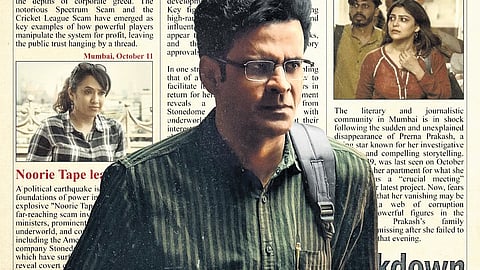

We use cookies to make our site work well
for you and so we can continually improve it.
The cookies that are necessary to
keep the site functioning are always on
Terms and conditions and
Privacy Policy




With his new film Despatch, which had its India premiere at MAMI Mumbai Film Festival this year and is streaming soon on ZEE5, Kanu Behl decides to steer clear of genre tropes. His crime journalist Joy (Manoj Bajpayee) is not someone who has the sole goal of uncovering the truth or ensuring justice. Joy doesn’t flaunt a badge of idealism.
Rather, he is incessantly human, with his own desires and shortcomings. It wasn’t smooth for Kanu to arrive at this insight. In 2016, Kanu and his co-writer Ishani Banerjee were immersed in extensive research. This involved reading reports of journalists’ deaths, observing the changing nature of media, and speaking to lawyers, scribes, cops and gangsters. That’s when they hit a roadblock.
“We realised that you will never really know who did what and why,” says Kanu, adding that they were unable to ‘uncover’ the truth. What they were left with were some questions: “What if you never find out what this journalist was trying to expose?” “Why are journalists in films reduced to being a ‘hero’ saving the day?” “Why don’t we see their human side?” Kanu and Ishani then decided to subvert the idea of a journalist and that of an investigative thriller.
The director calls Despatch a procedural. “We were going more for a character piece,” says Kanu. “We wanted to take viewers inside his life and get a sense of the time and space he is living in.”
The character of Joy seems similar to real-life crime journalist Jyotiromoy Dey, who was murdered by the Underworld in 2011. Jyotiromoy’s story formed the context of Hansal Mehta’s 2022 series Scoop. Kanu, however, says that Despatch is not based on any person. “Joy is just an amalgamation of all the journalists we met,” he says. “The goal was to paint a picture of a much larger world.”
Kanu’s earlier films have also provided different perspectives of looking at the world, be it the nuanced portrayal of a dysfunctional, criminal family in the unapologetically violent Titli (2015) or the exploration of sexual frustration in a young man from a small town in the audacious Agra (2023). He has worked mostly with fresh faces in the past, and with a seasoned actor like Manoj in the lead, Despatch comes as an exception.
“He, however, came in every morning as if it were his first day on set,” says Kanu. The filmmaker says it was Manoj’s urge to find the ‘moment’ every day that actually surprised him. “I have not seen that hunger even in beginners,” he says.
Kanu was initially concerned, owing to his unconventional approach of working with actors. His rehearsals include a lot of ‘random’ rhythm exercises, which have little to do with the scenes in the script. “One day we will just be walking together.

Sometimes you’re doing body language, trying to find how this character talks, or you are just meditating for half a day trying to find your centre as an actor,” he says. On such days, Kanu reveals that even Manoj was a bit “thrown off”. “‘What do you want?’ he would ask,” says Kanu. “But I had his trust, enough to turn around and say ‘I don’t know, let’s find out.”
What stands out in Kanu’s filmography is his peculiar approach to intimate scenes (In Agra, the protagonist goes at it with his partner on a dinner table, only to be horrified when she turns into a rat!). In Despatch, Joy is a philanderer involved with multiple women, played by Shahana Goswami, Rituparna Sen and Parvati Sehgal. “I don’t shoot sex scenes to titillate. They are a transaction of emotions,” he says.
Watching Kanu’s films is like battling our own expectations. The unpredictability lies in how he chooses to tell the story. Does he think of the audience while making his films? “I do have an audience in mind, but that audience is me,” he says with a smile. He explains that it is important for a director to not have an ego.
“If you have yourself interfering with the film, then it will never see the light of day.” He says he likes to maintain a distance from his films in order to let them become what they want to. “So, if I am not there as a filmmaker, what am I there for? Then I am there as an audience. I have this deep faith that if I, as an audience, want to see this film, then there are others out there who want to see it too,” he concludes.
Academy-Award nominated film director Mira Nair is best known for her groundbreaking films that cross borders of all kinds: Salaam Bombay! (Caméra D’or, Cannes 1988), the pioneering Asian-African romance Mississippi Masala (1991),
Read More...Head of Jury
David Michôd’s debut feature, Animal Kingdom (2010), won the Sundance Film Festival Grand Jury Prize, earned Oscar and Golden Globe nominations for supporting actress (Jacki Weaver) and was named Best First Film of 2010 by the New York Film Critics Circle. Michôd’s second feature,
Read More...The Criterion Collection calls New York-based Isabel Sandoval ‘one of the most exciting and multitalented filmmakers on the indie scene with a bold approach to cinematic style.’ She has directed three features, including Señorita (2011), which premiered at Locarno,
Read More...Edouard Waintrop has been an Artistic Director of several renowned international film festivals which include the Quinzaine des Réalisateurs in Cannes, a post he held for seven years and Fribourg International Film Festival in Switzerland for four years.
Read More...Kazakh film critic and researcher Dr Gulnara Abikeyeva was an artistic director of the Eurasia International Film Festival in Almaty from 2005 to 2013. She launched the film magazine Asia-kino, served as editor-in-chief of Territoriya Kino, and produced TV programmes about Kazakh cinema.
Read More...Head of Jury
Latika Padgaonkar is a columnist, editor, translator, former Joint Director of Osian’s Cinefan Film Festival, and former Executive Editor of Cinemaya, the Asian film quarterly. She was a foreign correspondent for The Telegraph in Paris in the 1980s;
Read More...Nashen Moodley is in his twelfth year as Festival Director of Sydney Film Festival. During his tenure, the festival has grown vastly. Moodley’s career in film programming has encompassed many leadership roles,
Read More...Aditya Shrikrishna is a freelance film critic and journalist from Chennai. He has been a published writer since 2013, and his work has appeared in The Hindu, Frontline, The Signal, The New Indian Express, Vogue, Fifty Two, Mint Lounge, Film Companion,
Read More...Senior critic, columnist and author Bharathi S. Pradhan is the former editor of Star & Style, Showtime, Lehren, Film Street Journal, Movie and Savvy (Consulting Editor). She continues to be a Sunday columnist with The Telegraph
Read More...Stutee Ghosh is an award-winning radio jockey, having won the prestigious India Radio Forum Best RJ Award. She started off while she was still doing her post-graduation in English Literature at Delhi University
Read More...Epic and intimate, 'Against The Tide' is transportive cinema, on the ground and under the sea. It’s a remarkable achievement, the director is in complete control over every aspect of the medium, plunging us into the elements while never losing sight of its deeply human core. Extraordinary cinematography, great humanity, humour and a wonderful way of seeing.
A deeply empathetic portrait of migrant lives, 'Bahadur' has a beautiful narrative rhythm and clarity of character, with great performances showing the strength of a director able to get a range of emotions from compelling non-actors.
A clear and audacious directorial signature, 'Agra' is unflinching and confident in its exploration of aspirational India.
For uniquely extending this spirit through exemplary innovation of cinematic form, the Rashid Irani Young Critics Choice is awarded to 'Kayo Kayo Colour? (Which Colour?)’.
Like birdsong at daybreak, hope rises from even the darkest nook of this city. Telling us it will get better. That there is joy to be found in what to the naked eye looks like scrap. From the first shot itself, this film evokes a sense of flight, of ascension. Each well-crafted frame and the easy natural performances feed this narrative with beautiful aesthetics, never losing its grip on what the filmmaker is trying to say. Joyous, confident, beautiful, satisfying. This gem of a film is all this and more. In five minutes this young filmmaker has given us hope. With such an easy display of heft and skill. So, of course, The Dimensions Mumbai Gold Award goes to ‘Nightingales In The Cocoon’ by Praveen Giri.
Dimensions Mumbai Silver Award goes to ‘Halfway’ by Kumar Chheda, for its simplicity, the use of the metaphor of meeting halfway in relationships, the writing that brought out nuances of partnerships, the technical execution of the film, the natural performances with the backdrop of a quintessential part of Bombay - the sea and Juhu beach - reminding us that it's a city that allows everyone to exist, without any judgement or differentiation.
The Best Film goes to ‘Summer of Soul’ directed by Sanjib Gogoi for being a moody portrait of sensitivity through strife and for its poetry without frills. A story that reinstates the fact that a bird put in a cage still doesn’t forget flight.
The Best Actor goes to James Elia as Shankar Pillai in Vakuppu for gliding through his performance as an authority figure, a wounded father, and a man weathered by time - all at the same time and all the time.
After much deliberation, considering the varied and engaging subjects of the shortlisted books, the jury has decided to award the meticulously researched book on cinema - ‘The Mahatma on Celluloid, a Cinematic Biography’ by *Prakash Magdum*. This book has significant and enduring value, not only to the student of cinema but also to the historian, the Gandhian and anyone studying media and communication worldwide.
Having a vibrant, perceptive and talented set of mentees made this year's lab sessions fun and stimulating. All these young critics handled a range of writing and participatory exercises with intelligence and sensitivity. Of course, this also made the task of choosing the best critic a difficult one. Here are the three runners-up for this year: Varun Bhakay, Aadhya Kancharla and Vanij Choksi. However, there was one writer who showed a special ability to combine personal, accessible writing with formal analysis and to also weave in a contextual understanding of film history. The best young critic is Diya Mathur.
In recognition of her lifelong commitment as an ambassador of Asian and Indian cinema internationally, and establishment of institutions that enable Asian talent through her work as a film critic, festival director, community builder and creator of organisations like NETPAC.
In recognition of her contribution of outstanding artistic significance to the field of film and cinema, for archiving the legacies of stalwarts of Indian cinema, and making Indian films accessible globally through her impeccable English subtitling of over 800 Indian films and counting.
In recognition of her lifelong commitment to showcasing Indian independent and art-house cinema at film festivals worldwide and creating visibility for Indian filmmakers and talent internationally through her work as a festival programmer and casting director.
Submissions Closed for 2023
Bhumi Pednekar
Ambassador, Dimensions Mumbai
Dimensions Mumbai is a competitive short film section that invites young filmmakers between the ages of 18 and 25 from all over India to submit films on the theme of Mumbai city. The films must be no longer than 5 minutes in length. Shortlisted films from all the entries will be shown on the big screen to an enthusiastic Jio MAMI audience. Dimensions Mumbai was first introduced to Jio MAMI Mumbai Film Festival in 2009 by Ms. Jaya Bachchan, and since then it's been one of the most sought-after sections at the festival. Many filmmakers who've won at Dimensions Mumbai have gone on to direct feature films and web-series.
Please read the Rules and Regulations by clicking on the View & Download Button below.
Jio MAMI Mumbai Film Festival will be held from October 27 to November 5, 2023 in Mumbai.
This year, Jio MAMI announces its new vision to host the world’s biggest and most prestigious South Asian Film Festival and Year Round Programme, focused on building an ecosystem for new cinematic voices, facilitating exchange of ideas, collaborations and business opportunities while bringing the best of world cinema to Mumbai. Jio MAMI will have two sections for South Asian and South Asian Diaspora filmmakers -
In addition to the above, Jio MAMI will showcase feature length films in the World Cinema section from around the world.
Submissions for the South Asia and World Cinema sections of the festival are closed.
Please read the Rules and Regulations by clicking on the View & Download Button below.
Copyright © 2026 by Mumbai Academy of Moving Image. All Rights Reserved.
